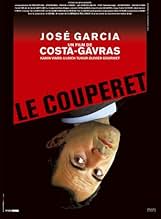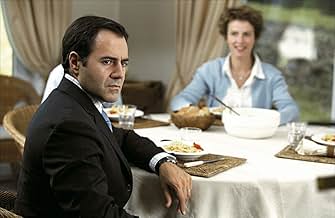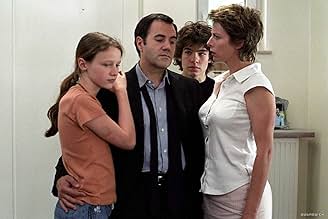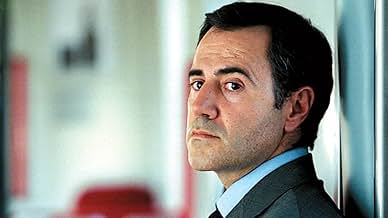IMDb-BEWERTUNG
7,3/10
8554
IHRE BEWERTUNG
Ein Chemiker (Garcia) verliert seinen Job durch Outsourcing. Zwei Jahre später und immer noch arbeitslos, findet er eine Lösung: Er will seine Konkurrenz wirklich ausschalten.Ein Chemiker (Garcia) verliert seinen Job durch Outsourcing. Zwei Jahre später und immer noch arbeitslos, findet er eine Lösung: Er will seine Konkurrenz wirklich ausschalten.Ein Chemiker (Garcia) verliert seinen Job durch Outsourcing. Zwei Jahre später und immer noch arbeitslos, findet er eine Lösung: Er will seine Konkurrenz wirklich ausschalten.
- Auszeichnungen
- 1 Gewinn & 5 Nominierungen insgesamt
Geordy Couturiau
- Maxime Davert
- (as Geordy Monfils)
Dieudonné Kabongo
- Quinlan Longus
- (as Dieudonné Kabongo Bashila)
Handlung
WUSSTEST DU SCHON:
- WissenswertesAds on billboards in the background were created by famous Italian photographer Oliviero Toscani, a friend of the director.
- PatzerAt the beginning, when Davert (Garcia) gets out of the shower and then immediately returns to the bathroom to vomit, you can see in the mirror that he is wearing an underwear.
- Zitate
Gérard Hutchinson: [When the interviewer abruptly ends the interview] I said to myself, lucky I didn't have the gun on me.
- VerbindungenReferenced in Elite Squad: Im Sumpf der Korruption (2010)
Ausgewählte Rezension
Costa Gavras is a master of the political film. Political films in general are not my cup of tea. They try to convey some kind of message to the public, and they do it by portraying the persons in a stylized way, losing in depth in the process. People are portrayed realistically but their conflicts are simplified because the political film intends to portray society and its problems - unemployment, hunger, class exploitation and so on - in other words, they talk about the big (lack of bread, for instance) and forget the small (emotions like loneliness and sadness, for instance).
Many political films concerned about their objectivity are quite emotionless, or else their emotions are one-sided - bad and ugly live here, beauty and love live there, or the other way around.
FEW POLITICAL FILMS are able to bridge this gap: to talk about society and at the same time not forget the individual man and his/her very complex universe and contradictions. SOME OF THESE FILMS ARE the masterpieces of neorealism: "Ladri di Bicicletta" and "Umberto D" by Vittorio de Sica, "Los Olvidados" by Buñuel and many others.
Costa Gavras doesn't reach this goal. His films are efficient and convey their message to the public, but they lack warmth.
"Le Couperet" is nonetheless an interesting film - a man that works as a chemist loses his job and after 2 years of unemployment decides to kill whoever stands in his way to get another job - so he places an ad of an imaginary enterprise in the newspaper offering a chemist job (his professional area) and rents a post box to read the answers he gets. He reads all the résumés and proceeds to kill all the people that are equal or more qualified than him - so that in the end he'll get the job because he will be the only remaining choice. All the while he will go on living normally with his family. He will suffer emotional crises, his marriage will become strained but no one will suspect anything at all of his alternative activities.
The film, after all, is very entertaining and gives a sad picture of France (and Western Europe I would say), suffering economic crisis and rising doubts. Is it possible with the globalization to maintain a very expensive Social Welfare and have to face a growing economic erosion? In USA (as far as I know), for instance, some unemployed people live on the streets or under the bridges. In France and Western Europe, unemployed people are still taken care of. Till when? Many enterprises are closing or cutting expenses (that means firing people).
Costas Gavras films are good because they make questions about the world in which we live, they make us think, but his films don't really touch me - I would say they provide food for thought but not food for the heart.
Many political films concerned about their objectivity are quite emotionless, or else their emotions are one-sided - bad and ugly live here, beauty and love live there, or the other way around.
FEW POLITICAL FILMS are able to bridge this gap: to talk about society and at the same time not forget the individual man and his/her very complex universe and contradictions. SOME OF THESE FILMS ARE the masterpieces of neorealism: "Ladri di Bicicletta" and "Umberto D" by Vittorio de Sica, "Los Olvidados" by Buñuel and many others.
Costa Gavras doesn't reach this goal. His films are efficient and convey their message to the public, but they lack warmth.
"Le Couperet" is nonetheless an interesting film - a man that works as a chemist loses his job and after 2 years of unemployment decides to kill whoever stands in his way to get another job - so he places an ad of an imaginary enterprise in the newspaper offering a chemist job (his professional area) and rents a post box to read the answers he gets. He reads all the résumés and proceeds to kill all the people that are equal or more qualified than him - so that in the end he'll get the job because he will be the only remaining choice. All the while he will go on living normally with his family. He will suffer emotional crises, his marriage will become strained but no one will suspect anything at all of his alternative activities.
The film, after all, is very entertaining and gives a sad picture of France (and Western Europe I would say), suffering economic crisis and rising doubts. Is it possible with the globalization to maintain a very expensive Social Welfare and have to face a growing economic erosion? In USA (as far as I know), for instance, some unemployed people live on the streets or under the bridges. In France and Western Europe, unemployed people are still taken care of. Till when? Many enterprises are closing or cutting expenses (that means firing people).
Costas Gavras films are good because they make questions about the world in which we live, they make us think, but his films don't really touch me - I would say they provide food for thought but not food for the heart.
Top-Auswahl
Melde dich zum Bewerten an und greife auf die Watchlist für personalisierte Empfehlungen zu.
- How long is The Ax?Powered by Alexa
Details
- Erscheinungsdatum
- Herkunftsländer
- Sprachen
- Auch bekannt als
- Jobkiller - Eine mörderische Karriere
- Drehorte
- Produktionsfirmen
- Weitere beteiligte Unternehmen bei IMDbPro anzeigen
Box Office
- Weltweiter Bruttoertrag
- 4.885.946 $
- Laufzeit1 Stunde 57 Minuten
- Farbe
- Sound-Mix
- Seitenverhältnis
- 1.85 : 1
Zu dieser Seite beitragen
Bearbeitung vorschlagen oder fehlenden Inhalt hinzufügen


![Bande-annonce [OV] ansehen](https://m.media-amazon.com/images/M/MV5BMWNjMWQ4ZmItOTVjMi00YzkxLWIzYmYtOWVjNTg3MDRkMzIwXkEyXkFqcGdeQXRyYW5zY29kZS13b3JrZmxvdw@@._V1_QL75_UX500_CR0)















